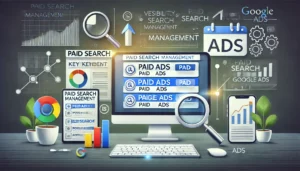What is Paid Search Management? How Can Paid Search Management Benefit My Business?

Paid search management is a way to make your business more visible online by paying for ads on search engines like Google. This guide will explain what paid search management is, how it works, and the benefits it can bring to your business. We’ll also look at how to choose the right platform and the importance of keyword research.
Key Takeaways
- Paid search management helps increase your business’s online visibility.
- It offers a cost-effective way to advertise and reach your target audience.
- Keyword research is crucial for a successful paid search campaign.
- Choosing the right paid search platform can impact your campaign’s success.
- Measuring your campaign’s performance helps improve your return on investment.
Understanding Paid Search Management
Definition and Key Concepts
PPC management involves overseeing and optimising paid advertising campaigns on search engines. This includes tasks like keyword research, bidding strategies, and ad copy creation. Effective management ensures that your ads reach the right audience and achieve your business goals.
How It Differs from Organic Search
While organic search focuses on improving your website’s visibility through SEO techniques, paid search involves paying for ad placements. The key difference is that paid search can deliver immediate results, whereas organic search takes time to build. Both strategies are essential for a well-rounded digital marketing plan.
The Role of Keywords in Paid Search
Keywords are the foundation of any paid search campaign. They determine when and where your ads will appear. By bidding on relevant keywords, you can target users who are actively searching for products or services like yours. This makes keyword research a crucial step in the process.
Paid search management is a dynamic field that requires constant monitoring and adjustment to stay effective. It’s not a set-it-and-forget-it strategy; it demands ongoing attention to detail.
In summary, understanding the basics of paid search management can significantly impact your business’s online presence and success.
The Benefits of Paid Search Management for Your Business
Increased Visibility and Brand Awareness
Paid search management allows us to place our business at the top of search engine results. This means more people see our brand when they search for relevant terms. Increased visibility leads to greater brand awareness, which is crucial for attracting new customers.
Cost-Effective Advertising
One of the biggest advantages of paid search is its cost-effectiveness. We can set our own budgets and only pay when someone clicks on our ad. This ensures that our advertising spend is used efficiently, providing a better return on investment compared to traditional advertising methods.
Measurable Results and ROI
With paid search management, we can track every aspect of our campaigns. This includes impressions, clicks, and conversions. By analysing this data, we can refine our strategy to maximise ROI. This level of detail is not available with many other forms of advertising.
Paid search management is one of the fastest ways to get to the top of the search engine results page for key terms you want your business to show for. It is also fundamental to provide information about your products or services to your target audience at different stages of the funnel. For this reason, paid search campaigns are an essential part of your digital marketing strategy, and it’s something we would always recommend.
How Paid Search Management Works
Bidding on Keywords
In paid search management, bidding on keywords is a crucial step. We select keywords that are relevant to our business and bid on them to ensure our ads appear when users search for those terms. The higher the bid, the better the chance of our ad showing up at the top of the search results. Effective bidding strategies can make a significant difference in the success of our campaigns.
Creating Effective Ad Copy
Creating compelling ad copy is essential for attracting clicks. Our ad copy needs to be clear, concise, and engaging. It should highlight the unique selling points of our products or services. We often use A/B testing to determine which ad copy performs best. This helps us refine our messaging and improve our click-through rates.
Targeting the Right Audience
Targeting the right audience is vital for the success of our paid search campaigns. We use various targeting options such as location, demographics, and interests to reach potential customers. By focusing on the right audience, we can ensure that our ads are seen by people who are most likely to be interested in our products or services. This not only increases our chances of conversion but also helps us make the most of our advertising budget.
Paid search management involves a lot of work, but it opens up opportunities to capture a wider audience and increase revenue.
Choosing the Right Paid Search Platform
Google Ads vs. Bing Ads
When it comes to paid search platforms, Google Ads and Bing Ads are the most popular choices. Google Ads offers a larger audience reach, given that Google is the most widely used search engine. However, Bing Ads can be a cost-effective alternative, often with less competition and lower cost-per-click rates. Choosing between these platforms depends on your business goals and budget.
Social Media Advertising Options
Social media platforms like Facebook, Instagram, and LinkedIn also offer paid search options. These platforms allow for highly targeted advertising based on user demographics, interests, and behaviours. This can be particularly useful for businesses looking to reach specific audience segments. Social media advertising can complement your search engine campaigns by increasing brand visibility across multiple channels.
Evaluating Platform Features
Each paid search platform comes with its own set of features and tools. Google Ads, for example, offers extensive keyword research tools and detailed analytics. Bing Ads provides unique audience targeting options and integration with LinkedIn. When evaluating platforms, consider the features that align with your business needs. A thorough evaluation will help you make an informed decision and maximise your advertising ROI.
By carefully selecting the right paid search platform, we can optimise our advertising efforts and achieve better results for our business.
The Importance of Keyword Research in Paid Search Management
Keyword research is the backbone of any successful paid search campaign. It helps us understand what our potential customers are searching for and how we can best reach them. By identifying the right keywords, we can ensure our ads appear in front of the right audience at the right time.
Identifying High-Value Keywords
Finding high-value keywords is crucial. These are the terms that not only attract a lot of traffic but also have a high conversion rate. We need to focus on keywords that are relevant to our business and have a good balance between search volume and competition. High-value keywords can significantly impact our campaign’s success.
Using Long-Tail Keywords
Long-tail keywords are longer and more specific keyword phrases. While they may have lower search volumes, they often have higher conversion rates because they target users who are further along in the buying process. For example, instead of targeting “shoes,” we might target “best running shoes for flat feet.” This specificity helps us reach a more targeted audience.
Tools for Keyword Research
There are several tools available to help us with keyword research. Tools like Google Keyword Planner, SEMrush, and Ahrefs provide valuable insights into keyword performance, search volume, and competition. Using these tools, we can make data-driven decisions to optimise our campaigns.
Effective keyword research is essential for maximising the performance of our paid search campaigns. By understanding what our audience is searching for, we can create more targeted and effective ads.
Optimising Your Paid Search Campaigns
A/B Testing Ad Variations
A/B testing is a powerful way to find out what works best in your paid search campaigns. By testing different versions of your ads, we can see which ones get the most clicks and conversions. This helps us make data-driven decisions to improve our campaigns. For example, we might test different headlines, descriptions, or calls to action to see which ones perform better. A/B testing can lead to significant improvements in your ad performance.
Refining Audience Targeting
Targeting the right audience is crucial for the success of your paid search campaigns. We can use various tools and techniques to refine our audience targeting. This includes using demographic data, interests, and behaviours to ensure our ads are shown to the most relevant people. By refining our audience targeting, we can increase the chances of our ads being seen by people who are more likely to convert.
Adjusting Bids and Budgets
Managing bids and budgets is an essential part of optimising paid search campaigns. We need to ensure we are getting the best return on investment (ROI) for our ad spend. This involves regularly reviewing and adjusting our bids and budgets based on performance data. For example, if a particular keyword is performing well, we might increase our bid to get more visibility. On the other hand, if a keyword is not performing well, we might lower our bid or pause the keyword altogether. This helps us make the most of our ad spend and achieve our campaign goals.
By continuously optimising our paid search campaigns, we can ensure we are getting the best results for our business. This involves testing different ad variations, refining our audience targeting, and adjusting our bids and budgets based on performance data. With the right strategies and tools, we can maximise the effectiveness of our paid search campaigns and achieve our business goals.
Common Challenges in Paid Search Management
Dealing with Click Fraud
Click fraud is a significant issue in PPC management. It happens when competitors or bots click on your ads with no intention of buying. This wastes your budget and skews your data. We need to monitor our campaigns closely to spot unusual activity and take action.
Managing Budget Constraints
Budget constraints are a common hurdle. We must balance spending enough to get results without overspending. Regular PPC audits help us identify areas where we can cut costs without sacrificing performance.
Keeping Up with Algorithm Changes
Search engine algorithms change frequently. Staying updated is crucial to ensure our ads remain effective. We need to adapt our strategies quickly to maintain our competitive edge.
Effective paid search management opens up prospects that can capture a wider audience, expand the keyword targeting pool, and increase revenue.
Hiring a PPC agency can help us navigate these challenges efficiently. They bring expertise and resources that can save us time and money.
The Role of a Paid Search Specialist
Skills and Expertise Required
Managing paid search campaigns involves a lot of work. A paid search specialist needs to be skilled in various areas to make informed decisions based on data and business KPIs. They must understand ad spend, budgets, and campaign optimisation. Additionally, they should be proficient in account buildout, audience targeting, and A/B testing. Effective paid search management opens up opportunities to capture a wider audience and increase revenue.
How to Choose the Right Specialist
When selecting a paid search specialist, it’s essential to look for someone with a proven track record. They should have experience in campaign reporting, ad copy creation, and competitor analysis. It’s also crucial that they are adept at keyword research and bidding strategies. A good specialist will help you identify opportunities and ensure your campaigns are performing well.
The Benefits of Hiring an Expert
Hiring a paid search specialist can be a game-changer for your business. They can help you achieve better results from your ad campaigns by making data-driven decisions. This means your campaigns will be more efficient, and you’ll get a better return on investment. With their expertise, you can focus on other aspects of your business while they handle the complexities of paid search management.
“Paid search management is one of the fastest ways to get to the top of the search engine results page for key terms you want your business to show for. It is also fundamental to provide information about your products or services to your target audience at different stages of the funnel. For this reason, paid search campaigns are an essential part of your digital marketing strategy, and it’s something we would always recommend.”
Integrating Paid Search with Other Marketing Strategies
Combining SEO and PPC
When we combine SEO and PPC, we create a powerful synergy that boosts our overall digital marketing efforts. While SEO focuses on long-term growth, PPC provides immediate visibility. This combination ensures our content gets the attention it deserves from the get-go. By promoting our blog posts, eBooks, or videos through search ads, we can drive traffic instantly. This not only supports our SEO efforts but also increases overall visibility and engagement.
Using Paid Search for Retargeting
Paid search is excellent for retargeting. We can target users who have previously visited our site with tailored ads, keeping our brand top-of-mind. This strategy increases the chances of conversions. For example, if someone clicked on our search ad but didn’t make a purchase, we can retarget them with a special offer on social media. This holistic approach ensures we capture and nurture leads at every stage of the customer journey.
Aligning Paid Search with Social Media Campaigns
Integrating paid search with social media campaigns allows us to create a cohesive marketing strategy. We can reach our audience across multiple platforms, ensuring consistent messaging. For instance, we can use search ads to grow our email list by promoting lead magnets or special offers. Then, we can nurture those leads through targeted email campaigns. This multi-channel approach maximises our reach and effectiveness, driving better results and achieving our business goals more efficiently.
When integrating paid search with other marketing strategies, we create a comprehensive, multi-channel approach that maximises our reach and effectiveness. It’s about using best practises to create a seamless experience for our audience, driving better results and achieving our business goals more efficiently.
Measuring the Success of Your Paid Search Campaigns
Key Performance Indicators (KPIs)
To measure the success of our paid search campaigns, we need to focus on Key Performance Indicators (KPIs). These metrics help us understand how well our ads are performing. Some important KPIs include click-through rates (CTR), conversion rates, and cost per acquisition (CPA). By tracking these, we can see which ads are working and which need improvement.
Using Analytics Tools
Analytics tools are essential for monitoring our campaigns. Platforms like Google Ads provide real-time data on ad performance. This includes insights into when our ads perform best and which keywords are most effective. Using these tools allows us to make quick adjustments to improve our results.
Interpreting Campaign Data
Interpreting the data from our campaigns is crucial. We need to look at trends and patterns to understand what is driving success. This involves analysing metrics like CTR and CPA, as well as looking at the overall return on investment (ROI). By understanding this data, we can make informed decisions to optimise our campaigns.
By analysing what works and what doesn’t, we can refine our strategy to maintain our competitive edge, attract more qualified leads, and ultimately, drive better business outcomes.
Future Trends in Paid Search Management
The Rise of AI and Automation
Artificial intelligence (AI) and automation are transforming paid search management. We can now use AI to optimise bids, create ad copy, and even target audiences more effectively. This means less manual work and more accurate results. AI-driven tools can analyse vast amounts of data quickly, helping us make better decisions.
Voice Search and Its Impact
Voice search is becoming more popular with the rise of smart speakers and virtual assistants. This trend is changing how we approach keyword research and ad copy. We need to consider how people speak, not just how they type. Voice search queries are often longer and more conversational, so using long-tail keywords is essential.
Evolving Consumer Behaviour
Consumer behaviour is always changing, and we must adapt our strategies accordingly. People are now more likely to research products online before making a purchase. This means our ads need to be informative and engaging. We also need to keep up with trends in social media and other digital platforms to reach our audience effectively.
Staying ahead of these trends is crucial for maximising ROI and ensuring our campaigns remain effective.
The Importance of Continuous Learning
The digital landscape is always evolving, and so should our skills. Regularly updating our knowledge and staying informed about the latest trends can give us a competitive edge. Conducting a social media ads audit is essential: learn why with our guide to ensure your strategies are up-to-date and effective.
The future of paid search management is evolving rapidly, with new trends emerging every day. Staying ahead of these changes is crucial for businesses looking to maximise their online presence. At PPC Geeks, we specialise in helping brands navigate this ever-changing landscape. Ready to take your PPC campaigns to the next level? Visit our page for a free, expert review of your ads today.
Conclusion
In summary, paid search management is a powerful tool that can significantly boost your business’s online presence. By carefully managing your ad campaigns, you can reach the right audience at the right time, ensuring that your marketing budget is used effectively. Whether you’re a small business or a large enterprise, the benefits of paid search management are clear: increased visibility, higher conversion rates, and better ROI. So, if you’re looking to take your digital marketing efforts to the next level, investing in paid search management is a smart move. Remember, the key to success lies in continuous optimisation and staying updated with the latest trends and strategies.
Frequently Asked Questions
What is paid search management?
Paid search management involves creating, managing, and optimising ads on search engines like Google. These ads appear when people search for specific keywords related to your business.
How is paid search different from organic search?
Paid search involves paying for ads to appear in search results, while organic search focuses on improving your website’s ranking through SEO without paying for ads.
Why are keywords important in paid search?
Keywords help determine when and where your ads appear. Choosing the right keywords ensures your ads reach the right audience at the right time.
What benefits can my business gain from paid search management?
Paid search management can increase your visibility, attract more customers, and provide measurable results, making it a cost-effective way to advertise.
How do I choose the right paid search platform?
Evaluate platforms like Google Ads and Bing Ads based on their features, audience reach, and cost. Consider your business goals and target audience when making a decision.
What is A/B testing in paid search?
A/B testing involves creating different versions of your ads to see which performs better. This helps optimise your campaigns for better results.
What are long-tail keywords?
Long-tail keywords are longer, more specific keyword phrases. They often have lower competition and can attract more targeted traffic to your ads.
Why should I hire a paid search specialist?
A paid search specialist has the expertise to manage and optimise your campaigns effectively, saving you time and potentially increasing your return on investment.
Author
Search Blog
Free PPC Audit
Subscribe to our Newsletter
The Voices of Our Success: Your Words, Our Pride
Don't just take our word for it. With over 100+ five-star reviews, we let our work-and our satisfied clients-speak for us.
"We have been working with PPC Geeks for around 6 months and have found Mark and the team to be very impressive. Having worked with a few companies in this and similar sectors, I rate PPC Geeks as the strongest I have come across. They have taken time to understand our business, our market and competitors and supported us to devise a strategy to generate business. I value the expertise Mark and his team provide and trust them to make the best recommendations for the long-term."
~ Just Go, Alasdair Anderson





